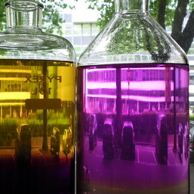Frequency Calculations on a Small System (high level vs. ONIOM)
The aim of this page is to compare the results of frequency calculations on bicyclo(10,2,2)hexadeca-1(15),12(16)13-triene between those given by ONIOM, CASSCF(6,6)/6-31G* on the whole molecule, benzene in isolation and the modes from the ONIOM calculation that are associated with the high level system.
We chose bicyclo(10,2,2)hexadeca-1(15),12(16)13-triene as our small system (it being the subject of a previous discussion: https://www.ch.ic.ac.uk/wiki/index.php/First_steps_with_ONIOM_:_excited_state_of_Bicyclo%2810%2C2%2C2%29Hexadeca-1%2815%29%2C12%2816%2913-triene). The high level method and basis set was chosen as b3lyp/6-31g(d), and the ONIOM layers as b3lyp/6-31g(d):amber.
Input and Output
ONIOM Input files
This is the original input file prior to assigning atomic charges for amber: Media:0raw.gjf
To find the charges:
1. Export the .com file to a cluster folder.
2. In the route section specify "#p oniom(b3lyp/6-31g(d):amber=qeq) geom=connectivity pop=full". The "amber=qeq" part of the job finds atomic charges using the qeq method (more information: http://www.gaussian.com/g_tech/g_ur/k_mm.htm).
3. Run the input file on the cluster.
4. As with GFP (https://www.ch.ic.ac.uk/wiki/index.php/GFP_:_Green_Fluorescent_Protein), open the .log file in an nedit window using X11 and copy all the missing charges (lines 5353 to 5392, sanity check line 5393). Paste into another nedit window displaying the input file from step 2, remove the "=qeq" keyword and save.
This is the end result: Media:1charges.gjf
ONIOM Frequency Calculations
Now run an "opt freq" calculation on the file 1charges.com. Output: Media:2optfreq.log
The formatted checkpoint files displays vibrations in GaussView 3.0, 4.1 or 5.0
Using the .chk file created, you can now run a "freq=sortmodes" calculation. This keyword prints frequencies according to ONIOM layer. Output: Media:3sortmodes.log
The main comparison we want to make between the two methods looks at the modes of the model to determine whether they compare well with those from the high level method. In an ONIOM input, the modes of the model are list with the keyword "freq=modelmodes". We've included the keyword "HPmodes" to print frequencies to a high level of precision. Output: Media:4modelmodes.log
High level input files
Quite simply, here is the input file for subsequent high level calculations: Media:high_level.gjf. The input orientation is taken from the optimisation of the ONIOM model.
High level Frequency Calculations
Here is the output from the "freq=hpmodes" calculation: Media:freq.log
There is no need to do a "sortmodes" or a "modelmodes" calculation since the input is all high level.
Comparison
Here is the list of frequencies calculated in 4modelmodes.log (i.e.: those associated with the model region):
16 22 23 32 33
A A A A A
Frequencies --- 409.0098 596.6039 665.1594 852.8351 865.1841
Reduced masses --- 2.7051 2.5761 6.3022 1.4695 1.4536
Force constants --- 0.2666 0.5402 1.6428 0.6297 0.6411
Percent ModelSys --- 68.1034 59.3840 86.7469 55.3040 61.8052
Percent RealSys --- 31.8966 40.6160 13.2531 44.6960 38.1948
IR Intensities --- 0.0044 14.5668 0.0873 0.3912 0.2297
39 40 50 51 53
A A A A A
Frequencies --- 970.2333 974.0159 1060.5563 1170.0279 1237.9576
Reduced masses --- 1.2998 1.3634 2.6869 1.3712 1.2316
Force constants --- 0.7209 0.7621 1.7806 1.1060 1.1121
Percent ModelSys --- 97.5852 99.5046 91.8918 98.5451 90.2186
Percent RealSys --- 2.4148 0.4954 8.1082 1.4549 9.7814
IR Intensities --- 0.4089 0.0260 1.4967 0.8189 0.1163
54 65 87 90 111
A A A A A
Frequencies --- 1245.8430 1382.6152 1663.4285 1717.0543 3182.3831
Reduced masses --- 1.7658 1.2489 5.8710 5.1623 1.0877
Force constants --- 1.6148 1.4066 9.5713 8.9674 6.4901
Percent ModelSys --- 52.3621 83.1773 70.9507 72.4910 99.9995
Percent RealSys --- 47.6379 16.8227 29.0493 27.5090 0.0005
IR Intensities --- 1.0287 0.0037 0.0585 0.1809 16.7578
112 113 114
A A A
Frequencies --- 3183.6449 3199.7525 3201.5732
Reduced masses --- 1.0880 1.0954 1.0957
Force constants --- 6.4971 6.6079 6.6172
Percent ModelSys --- 99.9953 99.9935 99.9992
Percent RealSys --- 0.0047 0.0065 0.0008
IR Intensities --- 0.1514 51.4042 0.1518
The corresponding modes in freq.log are given below:
16 22 23 32 33
A A A A A
Frequencies --- 387.9463 579.8860 655.1341 845.7905 862.0594
Reduced masses --- 3.0546 2.2340 6.5555 1.3171 2.2789
Force constants --- 0.2709 0.4426 1.6577 0.5551 0.9978
IR Intensities --- 0.0170 11.5675 0.0301 0.8178 0.2188
39 40 50 51 53
A A A A A
Frequencies --- 962.9661 972.9108 1112.6678 1124.2976 1189.9051
Reduced masses --- 1.3543 2.4918 1.3162 1.5015 1.3452
Force constants --- 0.7399 1.3897 0.9601 1.1182 1.1222
IR Intensities --- 0.1082 0.0529 0.9758 1.1525 0.0894
54 65 87 90 111
A A A A A
Frequencies --- 1208.0237 1336.8959 1525.1812 1664.6934 3192.0631
Reduced masses --- 1.4300 1.1364 1.0934 5.7955 1.0956
Force constants --- 1.2295 1.1967 1.4986 9.4625 6.5774
IR Intensities --- 0.8899 0.6101 3.0594 2.7069 35.0614
112 113 114
A A A
Frequencies --- 3195.4208 3198.2576 3221.8400
Reduced masses --- 1.0939 1.0946 1.0960
Force constants --- 6.5811 6.5966 6.7032
IR Intensities --- 45.5175 1.8373 20.4506
Back to ONIOM
